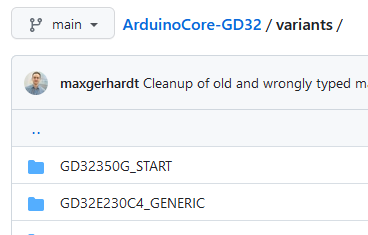I’ve build a small FW alternative for an existing PCB with a STM32F030R8T6 MCU.
I did it with:
platform = ststm32
board = nucleo_f030r8
framework = stm32cube
Now it turned out, that there’re also PCB’s with an GD32F330R8T6 in the wild.
The GD is fully pin compatible, but has a much quicker core (M4 instead M0), as well as double SRAM, …
platform = ststm32 as well as framework = stm32cube don’t support any GD device (for sure).
While searching for a possible new common code base, I found platform-gd32 and thought I could switch to framework = spl but unfortunately it turned out that it does not has support for STM32F030.
While digging deeper and deeper I stumbled over CMSIS-Arm and all the CMSIS Modules.
Well there’s everything… but… it would mean that I had to start from scratch… with damn bad documented stuff, whereas I’m spoiled by my lovely and comfortable PlatformIO.
I’ve now two main questions:
1.) Now that I saw all the CMSIS srcs, isn’t there a hacky way for me copying the GD32 CMSIS files to the correct place so that I can switch within my own header files the MCU variant? Or use a similar STM32 variant and hack the GD32 CMSIS data together?
2.) If 1.) is childish wishful thinking… which platform/framework can/shall I use so that I get a best possible common code basis?
